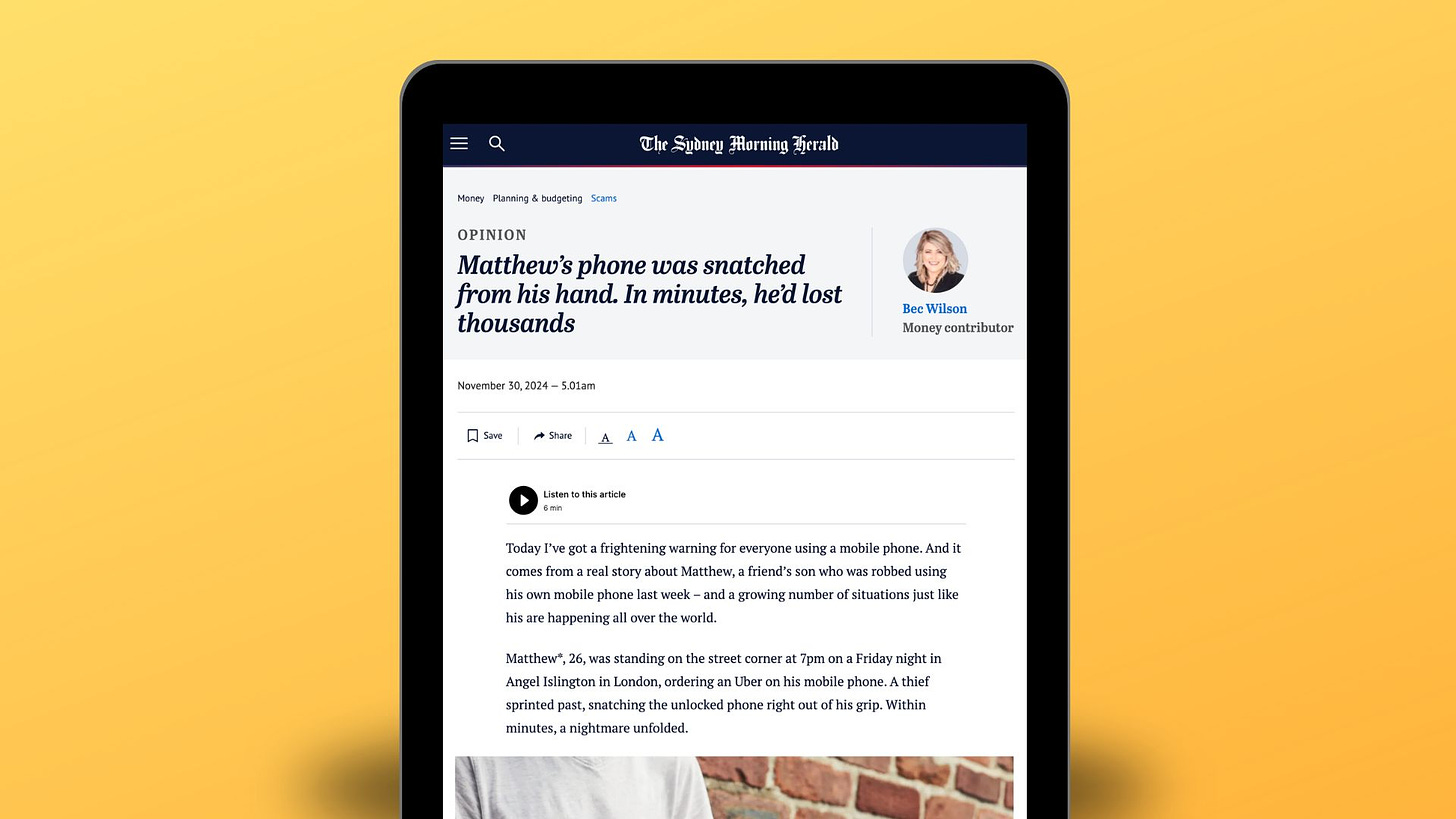Enshrining the role of super: it makes me want to ask why
And in today's newspapers, 'Matthew’s phone was snatched from his hand. In minutes, he’d lost thousands'
In this edition
Course: February program launching later this week
Feature: Enshrining the role of super: it makes me wonder why
From Bec’s Desk: The last push and one more big event
SMH/TheAge: Matthew’s phone was snatched from his hand. In minutes, he’d lost thousands (I want everyone to read this please!)
Prime Time: Talking to your adult kids about money
Autumn Flagship Course coming very soon
Our new, Autumn Edition of the How to Have an Epic Retirement Flagship Course is taking expressions of interest knowing our Earybird for the February program will be launching later this week. There will be a 25% early bird discount for the first 200 people so get in there and get your name down. February will be here before you know it.
Want to learn more ➡️ visit the website here
Enshrining the role of super: it makes me want to ask why
Ever worried about the rules of super changing before you got to spend it?
If you’ve ever been concerned that a future government might see superannuation as a giant piggy bank and change the rules before you retire, you’re not alone. A piece of legislation rushed through on Friday night shows the current government wants to address this concern. And today, I want to talk about why—because we all have a role to play in protecting our superannuation in the years ahead.
The Superannuation (Objective) Bill 2023 was passed late Friday, officially enshrining the purpose of superannuation in law. This bill defines the objective of superannuation as:
"To preserve savings to deliver income for a dignified retirement, alongside government support, in an equitable and sustainable way."
The government’s stated aim is to ‘provide clarity and stability to the superannuation system, ensuring that future policy changes align with this fundamental purpose.’ Not a bad aim, considering the widespread recognition that our superannuation system is one of the best in the world.
This legislation doesn’t stop future governments from trying to change the rules for their own political benefit, but it does make it harder. It requires any Member of Parliament who wants to introduce changes to the superannuation system to provide a ‘statement of compatibility’ explaining how those changes align with the newly legislated objective.
I’m fairly apolitical when it comes to super—I don’t care which government is in power. I only care that our money stays our money, that we can access it tax-free at a reasonable age, and that we enjoy our epic retirements without constantly shifting rules. So, I welcome this simple enshrinement of super. However, it did make me wonder what the current government might be afraid of future governments doing to the system they introduced back in 1992. Clearly, the Labor government has some hypotheses. This new legislation certainly gets in their way. So today, I dug around and explored some of the things the media has raised as potential concerns. Interestingly, each of these would be slowed—or even thwarted—by the need to explain how it aligns with the enshrined ‘purpose of superannuation.’
Hypothesise with me.
They could try to use superannuation as a giant piggy bank
Future governments—of any political persuasion—might see superannuation as an easy source of funds to balance the budget or support other initiatives. Under pressure to fund promises like infrastructure or social services, they could tap into the super system by adjusting tax rates or making policy changes. While the purpose of superannuation is now enshrined in law, subtle measures—like raising taxes on super earnings or restricting access—could erode its value. These changes might be sold as efforts to make the system "fairer" or "sustainable," but they could chip away at the benefits for those who have spent decades working hard to save for a comfortable retirement.
Squeeze or freeze the super guarantee
Superannuation guarantee rates are set to rise to 12% by 2025, but there’s always a chance future governments could freeze or even reduce this rate if the economy takes a dive. The SG rate is often seen as a hidden cost by businesses, and if the economy falters, governments might cave to pressure and delay or cut the rate. This would undermine long-term savings and make super less reliable for future retirees.
Play games with means testing and eligibility
While the new legislation sets the purpose of superannuation, it doesn’t prevent governments from changing eligibility rules for the Age Pension in the future, particularly as super balances rise. If governments face pressure to cut spending or address concerns about fairness, they might limit access to the Age Pension for those with larger super balances, forcing people to pay for their own retirements. This could target wealthier retirees, but for those who’ve saved diligently, it could mean reduced access to government support, even if they aren’t "wealthy" in the traditional sense.
Look to use wealth inequality as an agenda item to change super
Politicians are likely to continue using wealth inequality as a reason to push for changes in superannuation. High super balances are often seen as a symbol of economic inequality, and with a focus on wealth redistribution, higher taxes or reduced concessions for those with larger balances could be justified as "leveling the playing field." But this could harm those who’ve planned responsibly for retirement, penalising them for their prudent saving strategies.
Tapping into super for housing or infrastructure
There’s growing concern about the possibility of superannuation being used to fund housing or infrastructure projects in the future. Some politicians are floating ideas like allowing Australians to dip into their super for first-home deposits or other housing needs. On the surface, it sounds like a potential solution to help younger generations get into the property market, and the appeal of capital gains tax-free growth is undeniable.
However, the superannuation industry is strongly opposed to early withdrawals, and for good reason. Super is designed to provide income in retirement, not to solve short-term housing issues. Once the door to early access opens—even with good intentions—it risks becoming a slippery slope. It could pave the way for superannuation funds to be redirected toward broader government-led agendas, such as large-scale housing developments or infrastructure projects, which stray far from the system's primary purpose: securing Australians’ financial futures.
This debate raises critical questions about the balance between helping people today and safeguarding their retirement tomorrow.
—
Let’s face it - while the recent legislation provides some clarity about the "purpose" of superannuation, it doesn’t guarantee your retirement savings will remain untouched. Politicians know that super is a massive and continually growing pool of money, and it’s always tempting to tinker with it for political or economic gain. Whether through higher taxes, reduced concessions, or changes to means testing, there’s no shortage of ways governments could adjust the system to meet their needs.
So all of us have one job — to stay vigilant and work together to act in our own interests as pre-retirees and retirees. Super is a powerful tool, but it’s also a political football that can be kicked around depending on the government of the day. And none of us want a less-epic retirement for ourselves or our children because of politics.
Two major developments in Australian politics unfolded this week around superannuation and retirement. The government formally enshrined the purpose of superannuation in legislation, clarifying its primary goal as providing income in retirement to replace or supplement the Age Pension. And, more interestingly, the government's proposal to increase the tax rate on superannuation balances over $3 million from 15% to 30% hit a roadblock in the Senate. Opposition from independents and concerns about the treatment of unrealised gains have left the legislation in limbo.
With Parliament now adjourned for the year and a federal election required by May, the legislation’s future is uncertain. Significant laws rarely pass in the eight weeks leading up to an election, making the likelihood of progress slim unless Labor is re-elected. If not resolved, this issue could become a hot topic on the campaign trail or it could be a dead duck. Either way, it’ll be fascinating to see how this plays out.
—
This week, I’m heading down to Sydney to keynote the Women in Super Christmas party, and I’m pretty excited. They’ve got hundreds and hundreds of people attending—many more than expected—and I love it when that happens! If you’re going and you read this newsletter, please come up and say hi. Just a reminder that I live and work in Brisbane, so I don’t get to meet everyone all the time - and I really do love a chat. It’s always wonderful to meet you face-to-face and share ideas - especially when we can do so over a glass of end-of-year cheer!
This is my last event for the year - then I’m on the downhill run.
—
Before I stop for some R&R, I’ll be going back into the book tunnel for a few weeks to finish the international edition of How to Have an Epic Retirement - which is now just weeks from deadline. I’m really enjoying laying out the western world’s retirement systems in one book. Makes Australia look like the lucky country in so many ways.
I’ll be launching the next How to Have an Epic Retirement Flagship Course for February later this week. There will only be a limited number of Earlybird 25% off spots so it will be worth your while getting in early. You can register your interest on the website.
If you haven’t already, make sure you read the article in the Sydney Morning Herald this week. It’s a crude and important lesson with a to-do list for you.
Finally, don’t forget to send me your letters! I love them. Please, send them to bec@epicretirement.com.au.
Many thanks! Bec Wilson
Author, podcast host, columnist, retirement educator, and guest speaker
Matthew’s phone was snatched from his hand. In minutes, he’d lost thousands
Extract of article published in print in The Age, The Sydney Morning Herald, Brisbane Times, WA Today on Sunday 1st December 2024.
Today I’ve got a frightening warning for everyone using a mobile phone. And it comes from a real story about Matthew, a friend’s son who was robbed using his own mobile phone last week – and a growing number of situations just like his are happening all over the world.
Matthew*, 26, was standing on the street corner at 7pm on a Friday night in Angel Islington in London, ordering an Uber on his mobile phone. A thief sprinted past, snatching the unlocked phone right out of his grip. Within minutes, a nightmare unfolded.
With the unlocked phone in hand, the thieves had an open and free pass into Matthew’s financial world. They immediately reset his phone password, then set about using his email address and text messages, which they had direct access to, to confirm two-factor authentication on his bank accounts.
They transferred thousands of pounds from his accounts, intercepting the text messages to authorise the bank transfers that come into your phone. Then they started purchasing online gift cards with his credit cards. They also reset his passwords, locking him out completely.
Then, they accessed his WhatsApp, messaging his friends and his boss, claiming that he’d lost his phone and was stranded and in urgent need of money. More than £7,500 ($14,627) was transferred from his accounts – everything they could access using his online banking cards.
Matthew was initially slow to act – caught off guard by the situation and unaware of the full extent of the thieves’ plan or how to respond effectively. Fortunately, he was with two friends who helped him get home.
Please - everyone - read the rest of this article and the “What to do to prevent it - in today’s The Age, The Sydney Morning Herald, Brisbane Times and WA Today. It’s not paywalled.
Podcast: Talking to your adult kids about money
How do you talk to your adult or nearly adult kids about money? Today, we’re diving into their financial literacy and what you can (and what you shouldn’t) do to help. It’s all about tackling those tricky, hairy topics that come up as your kids start gaining financial independence, flying the nest, and even building their own—right at the time when you’re focusing on planning for your Prime Time and retirement.
In this episode, we’ll explore practical strategies for teaching your kids about money, helping them become financially independent, and empowering you to stay on track with your own financial freedom and retirement goals. And we’ll talk about the bank of mum and dad too.
Joining me is Kate Campbell, a finance educator and host of one of the most popular podcasts for the 25-45 generation. Kate brings invaluable insights to help us navigate these challenges with confidence and clarity.
LISTEN TO THIS EPISODE OF THE PODCAST HERE:
Order signed copies of How to Have an Epic Retirement for gifting season
You can now purchase a signed copy of How to Have an Epic Retirement. I’ve popped up an Australian online store where you can order your copy and get it in time for Christmas gift giving. It’s something I love to do.
If you’re a corporate and want to give signed copies as gifts - we’ve got a ‘bulk deal’ too. (Or don’t hesitate to contact me by email for larger bulk options). But time is getting tight.














